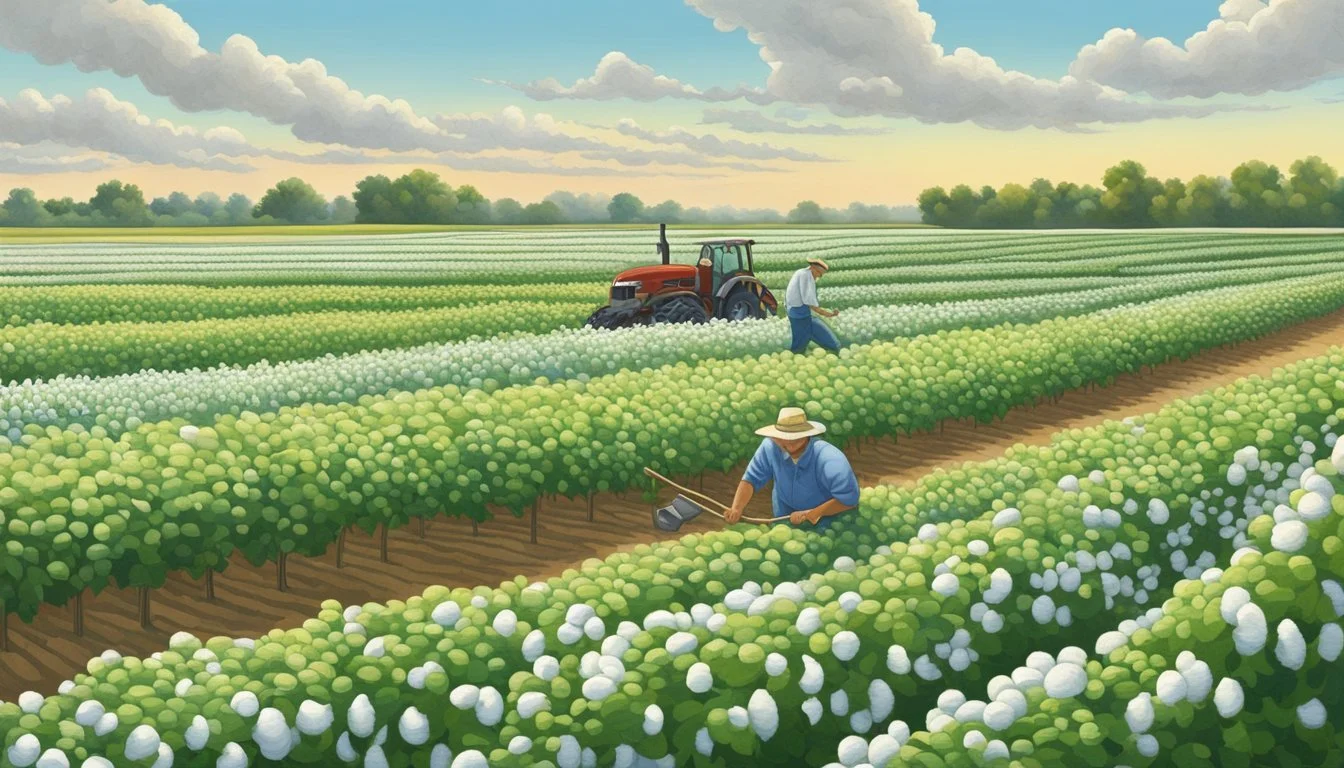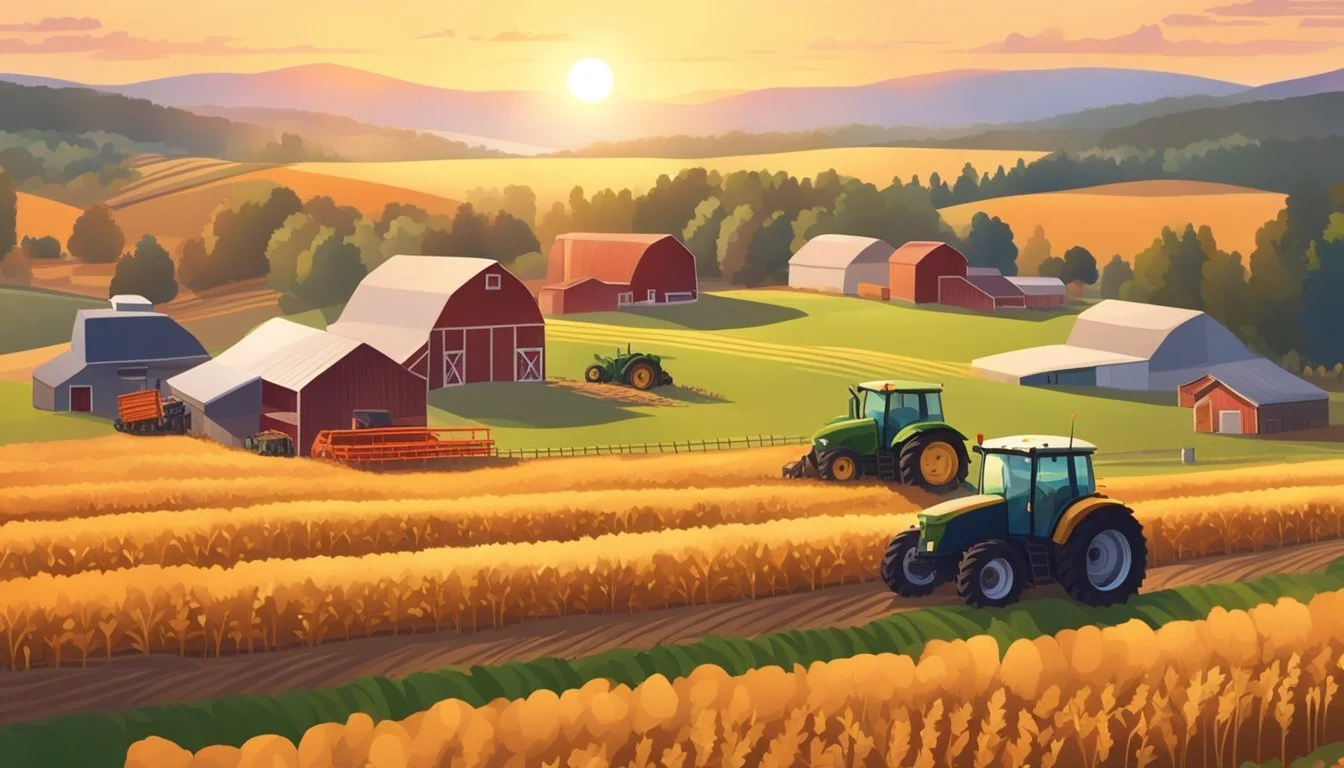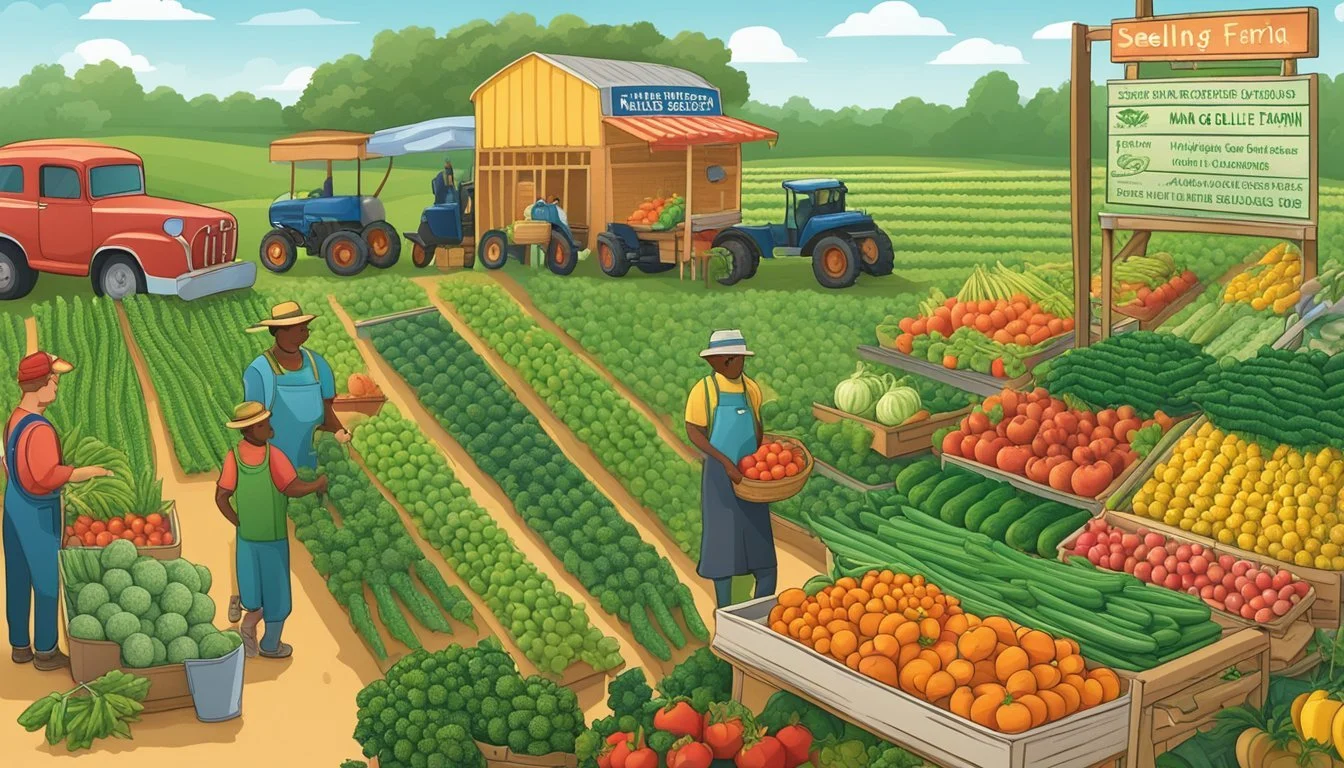Guide to Farming in Mississippi
Essential Tips for Successful Agriculture
This Article is Part of Our State by State Farming Guide
Agriculture in Mississippi is a cornerstone of the local economy, demonstrating resilience and diversity across its many fields. In this southern state, the farming community thrives on a tradition of cultivating a variety of crops, bolstered by the rich soil and favorable climate conditions. With an agricultural output that consistently ranks high in production of key commodities such as cotton, soybeans, (how long do soybeans last?) and poultry, Mississippi's farming practices reflect both time-honored methods and modern, innovative techniques.
Mississippi State University Extension Service plays a pivotal role in supporting local farmers through economic analysis, education on best practices, and technological advancements. The organization's efforts ensure that Mississippi's agriculture remains competitive and sustainable. Whether managing large-scale operations or tending to community garden plots, Mississippi farmers are equipped with the knowledge and tools to produce a bounty of crops.
Facilitating the access to fresh, locally grown produce, initiatives like the Mississippi Farm Marketplace connect farmers directly with consumers. This strengthens the bond between the community and local agriculture, emphasizing the importance of sustainable farming methods. Programs targeting beginning farmers and ranchers offer guidance in navigating the complexities of agricultural business, setting them on the path to contributing to Mississippi's robust agricultural sector.
History of Agriculture in Mississippi
Agriculture has been the cornerstone of Mississippi's economy and culture since its inception. With its temperate climate and fertile soil, especially in the Mississippi Delta region, the state has been conducive to a variety of agricultural practices.
Early Beginnings Originally, the region's agriculture was dominated by cotton, especially before the Civil War. The fertile alluvium soil of the Delta made it an ideal location for cotton plantations, which flourished and became the main economic driver for the state.
Post-Civil War Developments After the Civil War, agriculture in Mississippi began to diversify. While cotton remained important, farmers also turned to other crops like soybeans, corn, and rice. Additionally, livestock farming gained prominence.
Contemporary Landscape Today, Mississippi's agriculture extends across its 82 counties, encompassing large-scale farms and smaller operations. The state's leading commodities now also include poultry and catfish, reflecting a shift from the traditional cash crops.
Key Regions
Mississippi Delta: Known for its rich soil and optimum conditions for cotton, soybeans, and rice.
Hill country and Piney Woods: Regions where livestock and timber are more prevalent.
The history of Mississippi agriculture is a tapestry, marking the state's economic and cultural development. Its evolution from a cotton-centric economy to a more diversified agricultural landscape mirrors the broader agricultural trends across the southern United States.
Major Crops and Their Cultivation
Farming in Mississippi is a tapestry of diverse crop cultivation and animal husbandry. This region's fertile soil coupled with a moderate climate lays the groundwork for a variety of agricultural products, from row crops to poultry.
Row Crops
Mississippi's agriculture prominently features row crops such as soybeans, cotton, and corn. In 2023, the state harvested approximately 2,150,000 acres of soybeans producing over 122 million bushels. Cotton and corn, deeply entrenched in the soil of the state, contribute significantly to the agricultural output.
Soybeans are a staple in rotation, valued for both their economic and soil conservation benefits.
Corn, with its extensive acreage, plays a dual role in both animal feed and biofuel industries.
Cotton continues to be iconic to Mississippi's agricultural identity.
Fruit and Vegetable Farming
Mississippi cultivates a rich variety of fruits and vegetables, catering to both commercial production and home gardening:
Tomatoes, peppers, eggplant (What wine goes well with eggplant?), and leafy greens like lettuce and spinach thrive in the state's climate.
Root vegetables and gourds, including sweet potatoes, pumpkins, and squash, also hold a significant place.
The state sees substantial yields of watermelons and cucumbers, reflecting Mississippi's capacity for diverse horticulture.
Mississippians with limited garden space often plant beans, utilizing varieties such as bush and pole beans, as well as okra, which is suited to the warm temperatures of the region.
Poultry and Livestock
Poultry leads the livestock sector, with about 710 million broilers produced in 2023, and more than 1 billion eggs. The state's poultry farms are a critical component of its economic infrastructure, providing employment and trade.
Poultry production is central, with extensive operations spread across the state.
Eggs represent another key product, with numerous farms contributing to the large-scale output.
In addition to birds, cattle farming plays a role in Mississippi's agriculture. The dairy sector, with its production of milk, blends into the larger agricultural landscape, underpinning the state's commitment to livestock diversity.
Agronomy and Plantation Techniques
Guiding an agricultural venture to success in Mississippi requires a keen understanding of soil management, seed selection, and the implementation of crop rotation. These agronomic practices contribute significantly to the sustainability and productivity of the industry.
Soil Management
Proper soil management is pivotal for sustaining agricultural health and ensuring optimal crop growth. Farmers invest in soil tests to determine nutrient levels and adjust their fertilizer applications accordingly. Conservation tillage options are often employed to minimize soil erosion and improve water absorption. The use of cover crops assists in enhancing soil structure and providing a healthy habitat for beneficial organisms.
Seed Selection and Planting
Selecting the right seeds (how long do seeds last?) or transplants is crucial for a prosperous harvest. Farmers must consider disease resistance, yield potential, and climate adaptability when choosing varieties. In Mississippi, seeds of melons, beans, and leafy greens are often sown directly into the garden, while crops like tomatoes and peppers may start as transplants to ensure a robust start to the growing season.
Direct Sown Seeds Transplanted Crops Melons Tomatoes Beans Peppers Greens Eggplants
Crop Rotation and Diversity
Crop rotation and diversifying crop types can hinder the accumulation of pests and diseases while also managing nutrients effectively. A strategic rotation might include legumes such as beans or peas that fix nitrogen, followed by nitrogen-hungry crops such as corn or leafy greens. Incorporating a variety of crops, including hay or rice, when applicable, also spreads economic risk and potentially extends the market season for the farm.
Farm Machinery and Technology
Mississippi's agricultural industry is increasingly turning to advanced technology to enhance the efficiency of farming operations. Farmers in Mississippi are integrating precision agriculture tools and equipment to revolutionize their practices from planting to harvest.
Tractors: Essential for a variety of tasks, including plowing, tilling, and planting.
Combines: Used during harvest to efficiently gather crops like soybeans, corn, and wheat.
Planters and Seeders: Ensure precise seeding for optimal growth.
Sprayers: Distribute pesticides and herbicides crucial for protecting crop health.
Technological advancements have enabled more sophisticated equipment management, determining the annual costs of which can be complex due to depreciation, maintenance, and upgrades. To maintain competitive yields, Mississippi farmers utilize technologies such as soil moisture meters and GPS-based systems for site-specific crop management.
Technology’s Role:
Efficiency: Time-saving with automation and precise application of inputs.
Data Management: Helps in decision-making by tracking crop performance and soil conditions.
Cost Reduction: Although initially expensive, technology can lead to long-term savings through optimized resource use.
These evolutions in farm machinery and technology contribute to an industry that is more productive, cost-effective, and environmentally sustainable. The stakeholders, from equipment producers to farmers and agronomists, are focused on ensuring the industries remain on the cutting edge of agricultural innovation.
Sustainable Farming Practices
Mississippi's agriculture industry is increasingly embracing sustainable farming practices, focusing on organic methods and conservation techniques to ensure long-term productivity and environmental health.
Organic Farming
Organic farming in Mississippi adheres to practices designed to foster cycling of resources, promote ecological balance, and conserve biodiversity. Farms avoid the use of synthetic fertilizers and pesticides, opting instead for natural alternatives that maintain soil health and minimize harmful environmental impacts. They often incorporate:
Crop rotation: to prevent depletion of particular soil nutrients.
Green manure: using cover crops to enrich the soil with organic matter.
Companion planting: strategically growing certain plants together to naturally manage pests and enhance growth.
These methods contribute to cleaner water and healthier ecosystems surrounding the farm areas.
Conservation Techniques
Mississippi farms also implement a range of conservation techniques to protect and utilize natural resources responsibly:
Soil Conservation: Contour farming, cover crops, and reduced tillage practices help prevent erosion and preserve topsoil.
Water Management: Efficient irrigation systems and practices, such as drip irrigation, are employed to reduce water consumption.
Forestry Stewardship: Agroforestry practices blend agriculture and forestry techniques, improving land productivity and protecting biodiversity.
These techniques support the industry's goal of maintaining profitability while ensuring the sustainability of Mississippi's green landscapes and natural resources for future generations.
Irrigation and Water Management
Efficient irrigation is crucial for agriculture in Mississippi, where water resources play a significant role in the success of farming. Farmers manage water carefully, as crops typically utilize about 2.5-3 feet of soil to extract moisture, providing an average of 2.5-3.5 inches of available water without additional rainfall.
On-farm water storage (OFWS) systems are implemented as a best management practice, capturing surface water runoff for later use in irrigation. This approach aids in water conservation while ensuring farms have adequate water supplies during dry periods.
Mississippi State University's Extension Service offers the Row-crop Irrigation Science Extension and Research (RISER) program, which advises growers on irrigation water management (IWM) practices. These practices can reduce irrigation water use by up to 40% and increase profitability by approximately $40 per acre.
A commonly used irrigation method in the Delta is furrow irrigation. Farmers lay perforated poly pipes connected to water pumps on timers, directing water between crop rows. However, this method is not very efficient in terms of water use, and modern irrigation management tools seek to improve this by precisely determining water needs and the duration of water application.
Farmers are encouraged to adopt conservation practices, helping to sustain groundwater supplies. In agricultural landscapes, the compatibility of irrigation and conservation also supports wildlife habitat and biodiversity, leading to a more sustainable farming ecosystem in Mississippi.
Pest and Disease Control
In Mississippi's dynamic agricultural industry, managing pests and diseases is pivotal for securing the health and productivity of crops. Farmers and gardeners must practice Integrated Pest Management (IPM), a strategy that prioritizes sustainable and economical control measures. IPM involves a combination of techniques such as biological control, cultural practices, mechanical methods, and the judicious use of pesticides.
When addressing pest control, growers must monitor pest populations and apply insecticides based on established thresholds. It's crucial for the agricultural community to stay informed about the effectiveness of insecticides on various crops.
Disease management begins with selecting disease-resistant seeds and varieties. Adequate crop rotation and proper sanitation can reduce disease incidence. For tackling plant diseases, it's essential for farmers to understand the symptoms and have robust diagnostic resources.
Table: Essential Practices for Pest and Disease Control
Practice Description Regular Monitoring Checking crops regularly for signs of pests and diseases. Resistant Varieties Choosing seeds less susceptible to prevalent diseases. Informed Pesticide Use Applying chemicals based on performance ratings and safety. Crop Rotation Planting different crops consecutively to prevent disease. Hygiene & Sanitation Keeping equipment and fields clean to thwart disease spread.
Mississippi State University Extension Service provides resources, such as the Insect Control Guide, tailored for local conditions. This knowledge is indispensable to the maintenance of a healthy garden or field, allowing growers to make informed decisions in their pest and disease control strategies while minimizing harm to the environment.
Harvesting and Storage Procedures
Mississippi farmers employ precise harvesting techniques to ensure the quality and safety of crops such as corn and beans, staples within the agriculture industry. Harvest timing is critical; for corn, it usually begins when kernels are firm and moisture content is between 15-20%. For beans, timing depends on the pod color changing from green to yellow-brown.
Harvesting equipment should be calibrated specifically for the crop type to minimize loss and damage. For instance, combine settings for corn differ from those of beans to accommodate differing plant structures and harvest goals.
Post-harvest, effective storage is essential to maintain product quality and prevent losses from pests or spoilage. Farmers utilize:
Grain bins for aerated, dry storage, maintaining a low moisture environment
Silos for large-scale storage, often with temperature control features
Warehouses for bagged or containerized goods
It's integral to keep these storage facilities clean and to conduct regular inspections to deter pest infestation and disease.
Moreover, on-farm water storage systems in Mississippi not only support irrigation during the growing season but also serve, particularly for rice crops, in facilitating field flooding during harvest to aid in crop gathering and protection.
Mississippi adheres to the Produce Safety Rule, part of FSMA, ensuring crops like corn and beans are handled appropriately throughout the harvesting and storage processes to prevent contamination.
To summarize, meticulous harvesting schedules, combined with properly maintained storage solutions, are vital for maximizing yield quality and longevity in the Mississippi farming industry.
Marketing and Selling Produce
In Mississippi, farmers and agricultural businesses have a variety of avenues to market and sell their crops, ranging from local platforms to exporting goods. Effective strategies in these areas are crucial for the success of Mississippi's agriculture industry.
Local Markets and CSA
Farmers in Mississippi have the opportunity to sell their produce directly to consumers through farmers markets and Community Supported Agriculture (CSA) programs. Data indicates that farmers markets are not only popular but also lucrative sales venues, with Mississippi vendors generating impressive sales. They are a critical avenue for farms to connect with local communities, offering fresh, local produce to consumers and fostering direct relationships between growers and end-users. CSA programs further support this local engagement, where consumers can subscribe to the harvest of a particular farm or group of farms, ensuring a steady market for farmers and a consistent supply of fresh crops for the community.
Local Restaurants have also become significant buyers of local produce, looking to source quality, fresh ingredients for their menus. This farm-to-table trend bolsters the state's agriculture by keeping the food supply chain regional and supporting local farms.
Agricultural Exports
Mississippi's agricultural industry extends beyond local sales through the export of its agricultural products. The state's farms contribute to feeding not only the local community but also international markets. Crops such as soybeans, cotton, and poultry are among the top exports, reflecting the state's rich agricultural heritage and its ability to meet not only local but also global food and textile demands.
Farmers can also engage with the Mississippi Department of Agriculture and Commerce, which assists in promoting agricultural commodities. This support can help individual farmers and ranchers expand their reach to new domestic and international markets, highlighting Mississippi's key role in the wider agricultural sector.
Agricultural Policy and Regulation
Mississippi's agricultural policy framework is designed to safeguard the industry's integrity and promote sustainable practices. The Mississippi Department of Agriculture and Commerce (MDAC) plays a central role in enforcing agricultural regulations to ensure the state's agriculture thrives in a regulated and fair environment.
Specific regulatory areas under MDAC include:
Plant Protection: This includes regulations on plant diseases, insects, and weeds, integral for maintaining healthy crops.
Animal Health: MDAC sets out guidelines for bee disease regulations among other livestock health concerns.
Agricultural Inputs: The department oversees Commercial Feed, Fertilizer, and Agricultural Liming Materials to ensure quality standards.
Pesticide Application: Pesticide Law and Crop Spraying regulations are crucial for both environmental safety and public health.
Licensing: The body licenses aerial applicators, crucial for controlled pesticide and herbicide applications.
The Mississippi Farm Bureau Federation is pivotal in shaping agriculture-specific legislation. Their advocacy reflects the interests of farmers, ranchers, and rural communities, influencing policies that directly affect agriculture in Mississippi.
Key Legislative Actions:
Year Legislation Impact 2023 Various Agricultural Legislations Positive changes for farmers and ranchers.
The agriculture industry in Mississippi relies not only on good practices but also on a robust legal framework set by industry experts and regulators. Compliance with these policies ensures that Mississippi maintains its standing as a center of agricultural productivity and innovation while promoting ethical and sustainable farming practices.
Agricultural Communities and Support
Mississippi's agricultural sector, with farms spread across its 82 counties, benefits from the structure and support provided by organizations like the Mississippi Farm Bureau and various local farmers' associations. These entities play a critical role in advocating for farmers' interests, providing educational resources, and fostering community within the state's agricultural industry.
Mississippi Farm Bureau
The Mississippi Farm Bureau serves as a cornerstone of support for the state's farmers. Established with the mission to represent the agricultural community, the Bureau offers a myriad of services including policy advocacy, educational programs, and marketing assistance. Its engagement reaches farmers in all corners of the state, including the capital city of Jackson. The Farm Bureau stands as an ally in promoting the interests and sustainability of Mississippi farms.
Advocacy: Legislative representation at the state and national levels.
Education: Workshops, seminars, and resource dissemination.
Community Building: Facilitating connections among farmers.
Local Farmers' Associations
Local farmers' associations across Mississippi provide more localized support, tailoring their assistance to the specific needs of their community's agricultural producers. These associations are pivotal in ensuring that farmers in their respective counties have access to:
Networking Opportunities: Local events and meetings to share best practices.
Direct Support: Tools, resources, and advice specific to regional farming challenges.
Marketplace Advice: Aid with crop selection, direct sales to consumers, and agritourism.
By working together through these organizations, Mississippi's farmers are well-equipped to advance their industry and maintain the state's rich farming heritage.
Future of Farming in Mississippi
Mississippi's agricultural sector is a central component of the state's economy. It is advancing through strategic use of technology and a focus on sustainability.
Technology Integration
Mississippi State University (MSU) is at the forefront, having launched the nation's first Agricultural Autonomy Institute. This institute emphasizes research into autonomous technologies that aim to increase precision and efficiency on farms. Farmers in Mississippi are adopting these innovations to enhance their operations.
Conservation Efforts
Conservation is a priority, with farmers like the Hursts in Wilkinson County actively managing their land to promote soil health and sustainable cattle grazing. Techniques include:
Controlling weeds to improve pasture quality
Planting forages for optimal land usage
Soil enhancement practices
These efforts ensure the sustainability of Mississippi’s diverse landscapes for future generations.
Industry Diversity
Mississippi’s agriculture industry showcases diverse segments:
Poultry and forestry
Livestock and dairy
Row crops and agribusiness
Agriculture education
Each plays a role in shaping a robust agricultural framework adaptable to future challenges.
Challenges and Adaptation
Mississippi faces challenges, like the diminution of 'middle class' farmers, needing strategies that support small to mid-sized farms. The state's agricultural leaders, like Commissioner Andy Gipson, look to address these challenges through dialogue and policy.
Conclusion
As Mississippi’s agricultural industry evolves, the integration of technology, emphasis on conservation, and support for diverse farming practices will be vital to ensure a vibrant and sustainable future.









